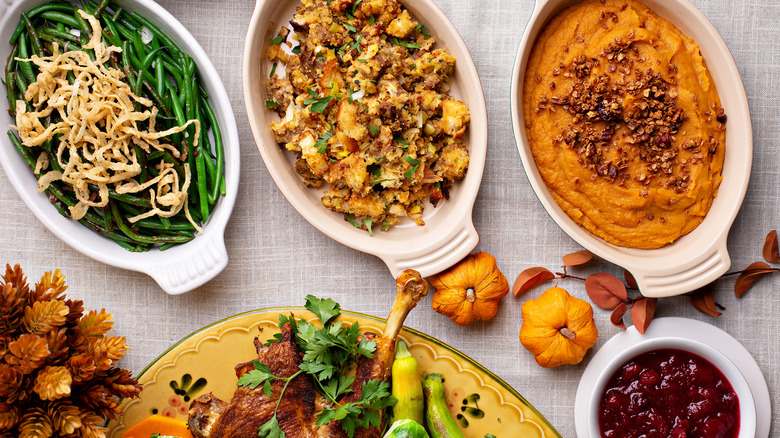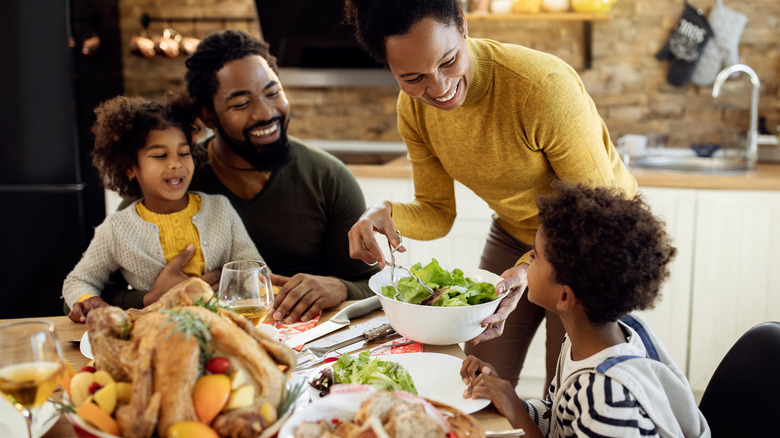The Real Reason You Love Controversial Thanksgiving Sides
A Thanksgiving meal wouldn't be a Thanksgiving meal without the sides — it'd just be a turkey. And when you really think about it like this, the sides become the most important part of the holiday dining tradition. From stuffing to green beans, mashed potatoes to fluffy rolls, Thanksgiving sides could fill an entire plate just by themselves.
But there are some side dishes that aren't, well, good. There are plenty of dishes people will claim don't bring anything to the table, and yet, every year as the turkey bakes and family catches up over the cornucopia and falling leaves, these items find their way into the Thanksgiving spread (via Eat This, Not That). So, why is this? What makes us know a dish isn't good — cranberry sauce, anyone? — and yet still take the time to bring it to fruition anyways?
To get answers to these questions, Mashed spoke with Dr. Nicole Avena, a research neuroscientist, expert in the field of nutrition, and author of "Why Diets Fail," to get her take on these universal experiences.
It's more about the tradition, not the actual food
According to Dr. Avena, Thanksgiving side dishes often aren't about the item at all; they're about the tradition and memories associated with the food. "A lot of dishes have been carried through generations and getting rid of them would mean getting rid of tradition," Dr. Avena explained. In some situations, cutting out a section of the meal could feel as guilt-ridden as cutting out a family member. OK, maybe it's not that dramatic, but the tradition and nostalgia of a dish are extremely important to people at this time of the year and it certainly doesn't feel good to leave anything out.
"A lot of the meals are nostalgic because many generations of the family have had the same meal, or even the same recipe for that meal," Dr. Avena shared, noting that when food and traditions are carried through for that long, the quality doesn't matter as much anymore. In fact, Dr. Avena goes so far as to say the quality of the food "is the least important thing about Thanksgiving."
"The purpose is to bring a group together and engage in tradition," she continued. "Sometimes, eating something is not for the actual taste of the food, but to stick with tradition and feel a part of a family ritual."
You can grow attached to food even if the quality isn't great
As Dr. Avena revealed to Mashed, it is completely possible to grow attached to something that doesn't actually taste very good at all. The reason for this: Memories. "It is possible to enjoy food because of a memory, regardless of the quality of the specific food," Dr. Avena said. She followed up and added, "A food can trigger memories that lead to a change in emotions, and therefore lead to a change in the feeling when that food is consumed."
This often happens because of sense memory. According to HealthLine, sense (or sensory) memory is the part of your brain that has to do with your five senses, taste, touch, smell, sight, and sound. Once you use one of these senses, the outlet explained, your brain will either process the information or discard it entirely.
"Sense memory is definitely at work here," Dr. Avena shared. "In this case, tasting something would trigger a memory and an emotional response." Often, families will make the same dishes year after year and often use the same recipe. Especially around Thanksgiving, it's easy to identify a certain taste with the happy feelings of being around family and loved ones, particularly if the same taste comes up year after year. As Dr. Avena concluded, "Tasting something would trigger a memory and an emotional response."


